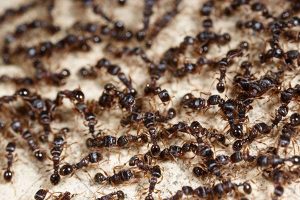
By Natalie Fraser.
Lily grips her walking frame tightly, her swollen knuckles turning white with the effort. To get down the step is the first thing. Then she must go up the path, unlatch the gate and turn on to the street. On the way she stops to sit on the seat near the patch of dried out grass that they call a park around here. She concentrates on putting one foot in front of the other. The shops used to be a ten-minute walk away, now it can take her up to half an hour to cover the same distance. Each trip is a battle hard fought, each return home a victory.
Lily’s suburb is made up of low weatherboard houses painted in washed-out greens and pinks. Successive governments have forgotten this suburb and most of the houses are tired and run down. There are no votes in public housing; it is easier to just leave the houses, the community centres, and the public schools to crumble. Each house is almost identical to the one next-door, even more so than in an ordinary suburb as this is prefabricated nineteen fifties public housing. Some people have taken the trouble to plant a garden, to mow the lawn but all the houses still conform to the same design, a two- or three-bedroom house with a front porch and a toilet and laundry off the back porch. In these houses live those on low incomes, the disabled, the unemployed, and people on age pensions like Lily.
She used to be scared to go to the shops. Around the faded shopping strip half of the shops are vacant and gangs of youth loiter. They are disdainful and sometimes openly rude to passing shoppers. Lily’s youngest son Drew cringes every time he walks past them. The elderly and the very young seem to have been granted an amnesty so they leave Lily alone. Like those in prison they have a hierarchy, a code of honour known only to them. They know they will never get out of this place; they know that the course of their lives has already been decided so there is bitterness beneath all the swaggering bravado, vulnerability. Lily can see this, and she feels some pity for them as they follow their destiny by painting graffiti all over the side of the local library, drinking in the park and vandalising the equipment in the playground. This suburb is like a worn-out shoe, holes in the sole, toe flapping like an open mouth.
Lily’s house is freshly painted in pale green with cream trim around the windows. She has a nice garden because Drew looks after it. The iceberg roses are pretty this year. She has always loved her roses. Lily is far too old for gardening, she is sure that even if she could manage to get down on her knees to tend the beds, she would not be able to get up again. She used to like the garden, the cycle of weeding, planting the seeds, watering, and waiting excitedly for the new growth. Harry used to do the pruning every winter, come spring the roses would bloom in a cascade of colour. Now she just has the white icebergs, they are easier to look after. Lily has accepted this compromise as she has accepted many others. This is what being old is and to use her grandkids’ language, it sucks.
Lily still gets her own meals. It is usually something simple like a grilled chop, a boiled jacket potato and some frozen peas. Sometimes Drew brings her a lasagne or quiche to heat up in the microwave. Sometimes she just makes do with cold meat and salad that she buys in a tub from the supermarket. Lily doesn’t like ‘Meals on Wheels’, she tried it once, it was Drew’s idea naturally. He liked the reassurance of someone popping in on her everyday as much as he liked the convenience of it. Lily didn’t like the food. She had been quite the talented cook back when Harry was still alive, so she knew what good food was and this wasn’t it. She didn’t like Emily, the patronising stranger who delivered it, barging in like that, pushing past her without being asked, heading for the kitchen to poke about in cupboards and drawers.
‘You need to get organised, love.’ Emily would say. ‘You could make things so much easier for yourself.’ Lily wasn’t listening. Both of her hands are swollen into painful claws from the arthritis but, if she goes slowly and doesn’t put too much weight on her bad leg, she can manage most things.
*
Drew backs his electrician’s van slowly out of the driveway. It is his last job for the day, and it took him less time than he thought. With a spare hour before he needs to get home to his wife Debbie and the kids he drives to his mother’s house. Drew is the youngest of Lily’s four children. He came ten years after his nearest sister, and they all spoiled him. He was the cute baby toddling on the lawn all eyes fixed on him, the whole family laughing in amazement at everything he did. As a result, he has morphed into an adult who is an incongruous mix of confidence and neediness, as if sometimes he is still that small boy, toddling on the green lawn.
At his mother’s house Drew stops to pick a couple of dead heads off the iceberg roses. He sees that the low box hedge that lines the path needs trimming.
‘I didn’t think you were coming today,’ his mother says grumpily as she opens the door. Drew feels unsettled; she is usually so glad to see him.
‘I finished my last job early.’ Lily isn’t listening, she is wearing an old nylon quilted dressing gown, the fabric pilled and worn to a dirty pink. Her normally neat hair is frowsy and unkempt. In the kitchen she fusses with the teapot and opens a packet of his favourite chocolate biscuits.
‘It’s all right, Mum, I don’t really want anything.’ She looks hurt so he takes a chocolate biscuit to keep her happy. ‘Can’t resist, Mum, you always have my favourites.’ Chewing on his biscuit he checks around the kitchen to see that all is in order. He sees that she has not washed her dishes from the night before. He fills the sink with soapy water and puts the dishes in to soak.
‘You don’t have to do those,’ Lily protests.
‘I don’t mind, Mum.’ He is finished in five minutes. Lily sits sullen at the kitchen table sucking on a tea-soaked biscuit.
He moves down the hall to the bathroom. There is no longer a bathtub; instead, there is a gleaming white shower cubicle with hand holds and a white plastic chair for Lily to sit on as she washes herself.
‘How did that leaky shower arm go, Mum? Did I tighten it up enough?’
‘It works a treat now, son. I wish you wouldn’t fuss so much.’ Drew inspects the shower cubicle, moves the shower arm up and down a couple of times. He looks down and notices a thin trail of ants crawling across the pristine white porcelain. I must bring something to get rid of those, he thinks before turning on the shower and washing them down the plughole.
Lily wakes around five-thirty these days. Sometimes she tries to get back to sleep but it is no use. Once she is awake, she is awake and there is nothing to be done about it. She has always been like this, decisive. With a bit of effort, she gets herself out of the high double bed that she used to share with her husband, Harry. That was until a couple of years ago when he passed on. Though passed on is not really the right term, implying a journey to somewhere. Harry wasn’t a religious man; the war had cured him of that once and for all. Harry knew he wasn’t going anywhere. That was what he looked forward to, an empty blackness. Once, he had been her lover, her husband, but at the end he was a moody old man dribbling into his food with a colostomy bag that she had to maintain attached to the right-hand side of his torso. Illness and old age had made him angry at the end, and Lily had borne the brunt of it. Oh, the smell! She remembers that she had tried to hide her nausea when she changed the bag, though sometimes she couldn’t help a sort of hopeless dry retching. Then she had needed to leave the room. When she rolls over at night, she can still feel his imprint on the mattress, on the side near the door in case there is an intruder.
In the kitchen she fills the electric kettle and places a teabag in a cup. She used to be a snob about making a proper cup of tea in a pot, giving the tea time to draw. Now she finds a teabag easier though she can still taste the difference. The problem with this new world that Lily inhabits is that things are often made easier, but they are almost never made better. She takes her inferior cup of tea to the kitchen table before shuffling laboriously back to the bench to shake some cereal into a bowl and slice a banana.
Drew mops up the last of his bacon and eggs and pours another cup of tea. Debbie, sitting opposite, chews on her unwelcome cereal. She is trying to lose weight though she isn’t getting far. As soon as she starts a diet, her body seems to revolt. Her genes and pear-shaped figure are working against her. She will never be like the blonde women at the local cafes, she will never be slim and assured like that. This morning she no longer cares. She wants his bacon and eggs. This time in the morning is one of the rare moments when they are alone together. The kids have been picked up by a neighbour for the school drop off. Debbie, in her Tarago van, does the afternoon shift.
‘I’m a bit worried about Mum,’ Drew sips his coffee and lights his one cigarette for the day. ‘She seemed a bit funny yesterday.’
‘She’s an old lady, Drew.’
‘I know but I’ve got a full day and there’s Davey’s party tonight. I’m meeting the guys. I don’t think I’ll have time to drop in today.’ Debbie gets up to clear the table, her mouth is set in a hard line.
‘If you’re really worried why don’t you ring Tom, or Cheryl? Lily’s their Mum too.’ She crashes the dishes into the sink angrily.
‘Tom is in Perth and Cheryl’s got one of those New Age conventions, you know, fucking crystals or something, anyway she’s not around.’
‘She never is,’ says Debbie tightly. ‘Look Drew, I’m sure she’ll be OK, you can check on her tomorrow.’
‘Yeah, I know,’ Drew picks up his lunchbox. ‘Anyway, I’d better get going, those jobs won’t wait.’ He kisses her and heads out the door.
As Lily steps into the shower, she already knows she is going to fall; it’s as if she is watching the whole thing in slow motion. She feels a crack in her hip and a sharp stab of pain as she goes down. She lies there for a while, feeling more surprised than anything. Then she tries to move, but her legs are not responding. She manages to wiggle her fingers then her hand but what use is a hand if she can’t move her arm? The pain in her hip is deep; she can feel beads of sweat breaking out on her forehead. She can’t wipe them away. She racks her old brain, trying to think what she can do. She can see her emergency buzzer, the one she usually has around her neck, hanging from the hook on the back of the door. There is no chance of her reaching it. She calls out feebly, knowing there is nobody there to hear her. She lies there for what seems like hours finally succumbing to a fevered sleep.
When Lily wakes up it is dark. She tries to open her eyes, but there is something crawling on her eyelids. Her eyes are sore and itchy. It is the ants. She finally manages to move her arm and tries to brush them off, she shuts her eyes tight. Her whole body is itching; the ants are in her ears and in her nose. Trails of ants are crawling down the depression between her flat old breasts and spreading out across her flabby stomach. They are in places a woman of her era barely dares to think about let alone name. They are trying to get inside her. They want her vital organs.
Drew presses hard on the doorbell. There is no answer. He tries again, holding the button down for longer this time. There is still no answer. He tells himself that she has probably dozed off. From his pocket he removes the spare set of house keys that he carries around in case of emergency. In the hall it is eerily quiet. He calls out as he moves from room to room, gently at first, then more urgently, trying to hide the panic in his voice. The bathroom is the last room he checks. On the floor of the shower cubicle, he sees a black mounded form. It is still but covered in a moving carpet of ants. He stares at it for a while before he registers that this black mass is his mother. By the time the ambulance arrives Drew has managed to wash most of the ants off. Lily sits broken on the white shower chair. The paramedics move her on to a stretcher and Drew goes in the ambulance with her to the hospital. In the emergency department they discover a broken hip.
The aged care home that Lily is transferred to on her release from the hospital is one of the better ones. The nurses are kind and Lily has a large, sunny room to herself. Each day she spends hours sitting in her chair staring blankly at the television screen. The staff are careful to make sure her room is free of insects but sometimes one or two get in. Then she cannot be calmed. Now when he visits, Drew no longer brings her food or flowers. He knows that’s not what she wants. He stops at the local hardware barn and buys ant rid, surface spray, insect repellent. He knows there is nothing else that can make her smile.

ABOUT THE AUTHOR
Natalie Fraser is a Geelong West based writer of short stories, fiction, non-fiction, and memoir. She has written a food blog, notimeforporridge.com, and performed at many spoken word events and festivals ranging from Melbourne Fringe to the St Kilda Festival. Over the years she has been published in various literary magazines including Going Down Swinging. She has been longlisted and shortlisted for a number of literary prizes around Geelong and Melbourne including the inaugural Djillong Short Story Prize and the Glen Eira ‘My Brother Jack’ award where she was also highly commended. She has won the Ada Cambridge Prize for Biographical Prose at the Williamstown Literary Festival twice – in 2014 and 2021. She is currently working on an anthology of short stories and a memoir. Natalie joined Geelong Writers in 2021 and has found it to be a valuable resource and a great way to meet other local writers.

Leave a Reply